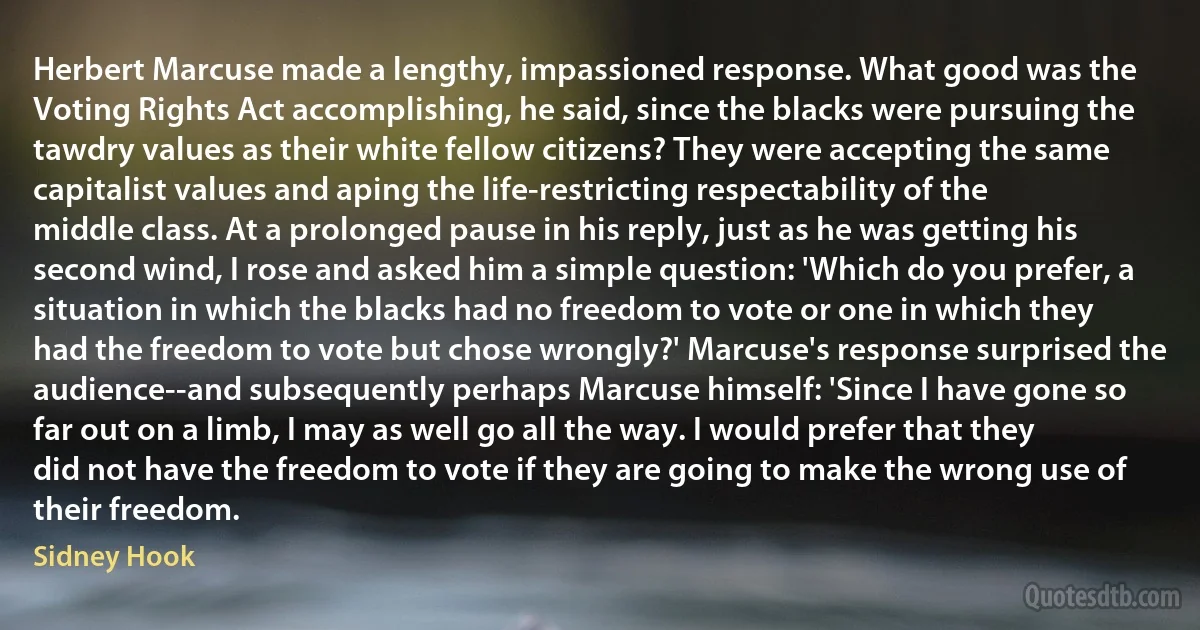
Herbert Marcuse made a lengthy, impassioned response. What good was the Voting Rights Act accomplishing, he said, since the blacks were pursuing the tawdry values as their white fellow citizens? They were accepting the same capitalist values and aping the life-restricting respectability of the middle class. At a prolonged pause in his reply, just as he was getting his second wind, I rose and asked him a simple question: 'Which do you prefer, a situation in which the blacks had no freedom to vote or one in which they had the freedom to vote but chose wrongly?' Marcuse's response surprised the audience--and subsequently perhaps Marcuse himself: 'Since I have gone so far out on a limb, I may as well go all the way. I would prefer that they did not have the freedom to vote if they are going to make the wrong use of their freedom.
Sidney HookRelated topics
act aping capitalist chose far fellow freedom getting good middle perhaps question reply respectability rose say second simple situation tawdry use voting way well white wind wrong herbertRelated quotes
Probably, I wound up-if not as a jack-of-all-trades-at best as a thirdrate polymath never able to focus these curiosities into a commanding "view of life.” The most practical solution appeared to be to make a profession of observation, to become a reporter simply, a profession easily damned as that of a fence-sitter, a moral coward unwilling to take a stand, a chronic water-treader who lacks the strength to take the plunge. To these strictures, I can only reply that once every four years at least I take a stand: I vote. And immediately afterward return to my reporting habits and the continuing discovery that in life the range of irreconcilable points of view, characters, flaws, idiosyncrasies and virtues is astounding, and that in politics there is very often much to be said on both sides, and sometimes on three or four.

Alistair Cooke
[W]hen the White House refused to speak directly and clearly about this matter, we were weakened as a nation and a tyrant was strengthened... The dodge on Putin broke with the basic American moral tradition. It broke faith with our core values. It broke trust with freedom seekers across the globe... To those who struggle, we have always said, ‘we see you, and we stand with you.' These simple truths matter. The moral responsibilities of the office of the presidency matter, and when we don't affirm these basic truths, it is a failure to who we are. It is a failure to do what we do, and it is a betrayal, not just to the millions of people who are denied free and fair elections in Russia this week, but it is a failure to people all across the globe who are struggling in darkness against tyrants.

Ben Sasse
I always felt, in looking at [the Cuban] situation, that it was wrong. And I now know why. It came to me one night in Mexico. China is communist, the same as Cuba, and yet we have no problem trading with China. In fact, today we can't get over there quick enough. The difference is simple: China welcomes our corporations. Cuba threw them out. It's a basic decision of corporate America: We will punish Cuba because Castro stuck it to us by nationalizing everything after he came to power. What other reason could there be? China is far more powerful but we now welcome them into global trade with open arms-as we should-while we continue this bitter, hostile policy towards Cuba. It must be because there are still people alive in the corporate world who got hammered by Fidel's revolution.

Jesse Ventura
When you traveling by bus, it is always difficult to decide whether you should sit in a seat by the window, a seat on the aisle, or a seat in the middle. If you take an aisle seat, you have the advantage of being able to stretch your legs whenever you like, but you have the disadvantage of people walking by you, and they can accidentally step on your toes or spill something on your clothing. If you take a window seat, you have the advantage of getting a clear view of the scenery, but you have the disadvantage of watching insects die was they hit the glass. If you take the middle seat, you have neither of these advantages, and you have the added disadvantage of people leaning all over you when they fall asleep. You can see at once why you should always hire a limousine or rent a mule rather than take the bus to your destination.

Daniel Handler
General systems theory, in a sense, is no news at all, as Von Foerster found out when he attempted to organize a conference of general systems people and anthropologists. In a sense, the situation is comparable to that found by the Committee for the Study of Mankind, in which a committee that included Robert Redfidd tried to get each discipline to consider its relationship to the concept of Mankind. Anthropologists replied, "we are related already," and so they were. Something similar may be said of attempts to date in mathematical anthropology. The kind of information that a computer program can finally provide, on a level of a particular culture, is simply a reflection of how detailed field work has been done, and to the careful field worker, on kinship, for example, it provides no illumination.

Margaret Mead
